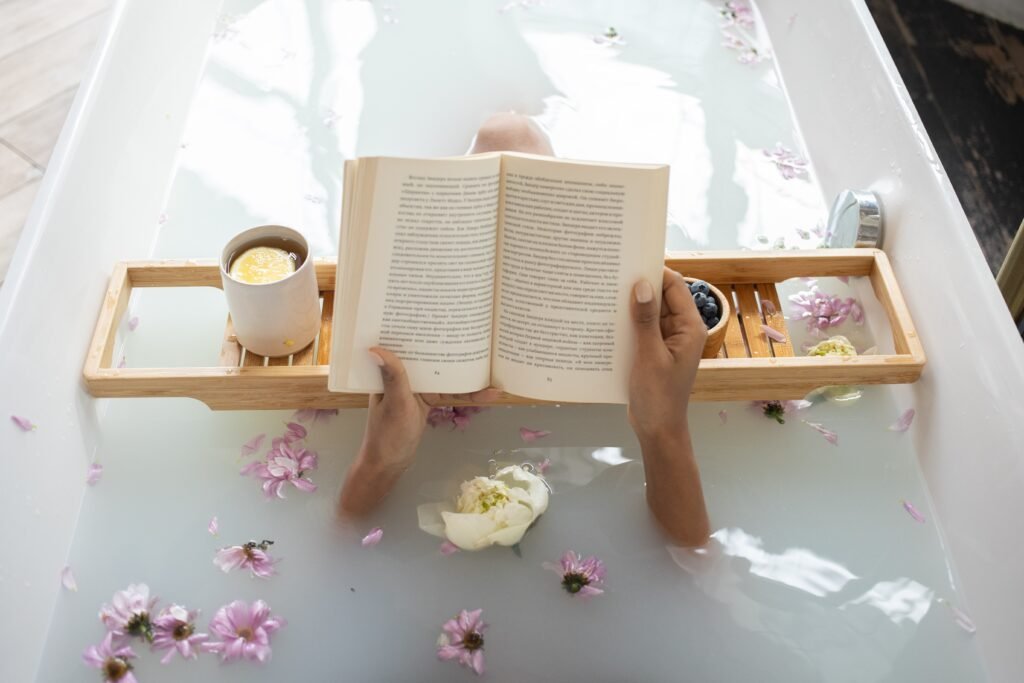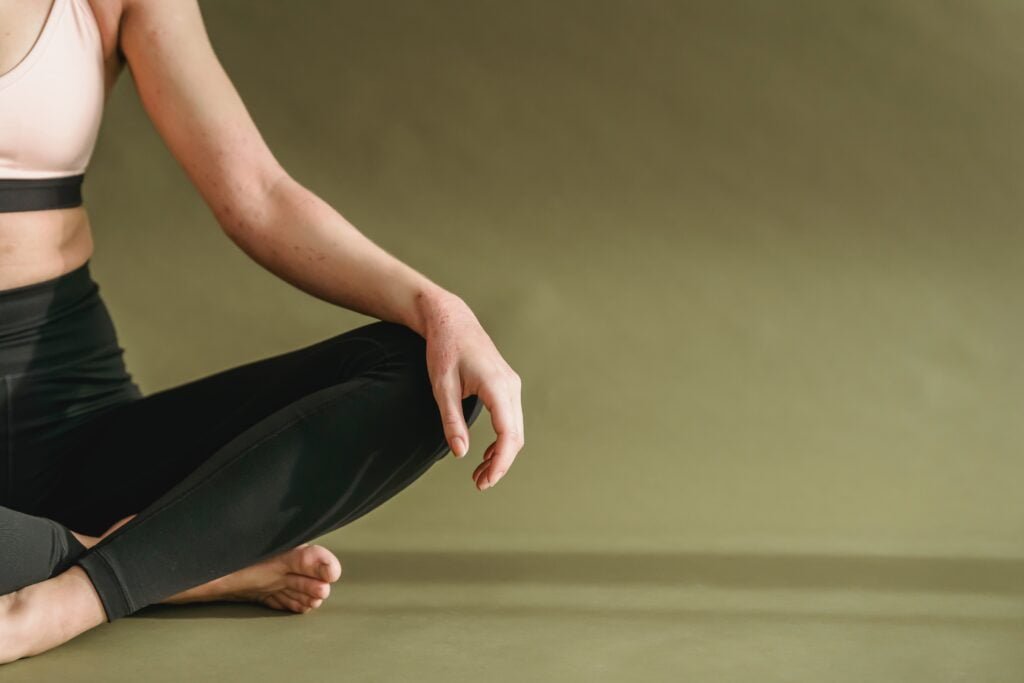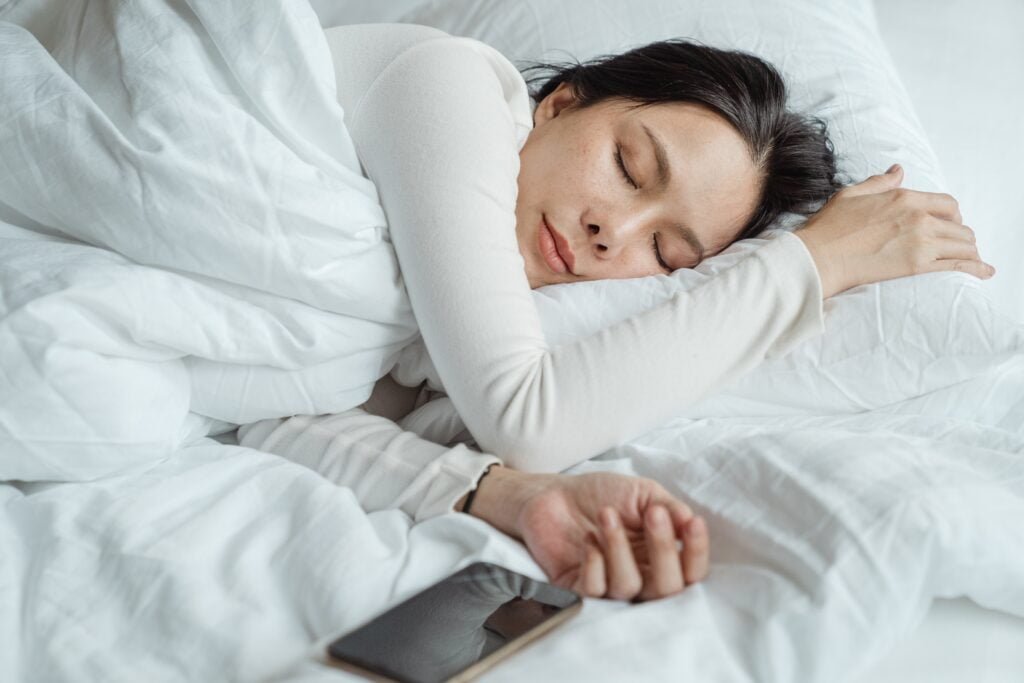“How a Good Night’s Sleep Slows Aging!” – It’s a claim we’ve all heard, but how much truth is there to it?
As we navigate our busy lives, prioritizing sleep often takes a backseat.
Yet, consistent and quality rest is not just about feeling refreshed the next day.
The beauty of sleep goes beyond the surface; it plays a crucial role in our skin’s health and our overall aging process.
Dive in as we unravel the rejuvenating mysteries of sleep and discover how it can be our ultimate anti-aging elixir.
Some of the links in this post are affiliate links. This means if you click on the link and purchase the item, I will receive an affiliate commision at no extra cost to you. All opinions remain my own. Read more on our Privacy Policy page.
FAQs
1. What is the best way to sleep for anti-aging?
Sleeping on your back is considered the best position for anti-aging as it minimizes contact between your face and the pillow, reducing the risk of developing wrinkles or sleep lines.
2. How many hours of sleep do you need for anti-aging?
Aim for 7 to 9 hours of quality sleep per night to promote anti-aging benefits and support overall health and well-being.
3. What should I put on my face before bed at night?
Before bed, cleanse your face to remove makeup and impurities, then apply a moisturizer suitable for your skin type. Additionally, consider using products like serums or overnight masks that target specific skin concerns.
4. What time should I sleep for good skin?
It is generally recommended to establish a consistent sleep schedule and aim to go to bed at a reasonable time, ideally before 11 p.m. This allows your body to maximize its natural rejuvenation processes, promoting good skin health. However, individual sleep needs may vary, so find a bedtime that works best for you and allows for adequate sleep duration.
5. Can lack of sleep affect my skin’s appearance?
Yes, inadequate sleep can negatively impact your skin’s appearance. Lack of sleep can lead to dull skin, dark circles, fine lines, and increased signs of aging due to the body’s reduced ability to repair and regenerate during sleep.
6. How can I improve my sleep quality for better skin?
To improve sleep quality, establish a consistent sleep schedule, create a sleep-friendly environment, practice relaxation techniques before bed, limit screen time before sleep, and maintain a healthy lifestyle with regular exercise and a balanced diet.
7. Are there any natural remedies to promote better sleep and anti-aging effects?
Yes, certain natural remedies can help promote better sleep and anti-aging benefits. Examples include incorporating relaxation techniques like meditation or aromatherapy, using herbal teas like chamomile or lavender, and ensuring a comfortable sleep environment.
8. Can stress impact my skin’s aging process?
Yes, chronic stress can accelerate the skin’s aging process. Stress triggers the release of cortisol, a hormone that can break down collagen and elastin, leading to wrinkles and sagging skin. Managing stress through techniques like exercise, mindfulness, and stress reduction strategies can help promote healthier skin aging.
RECOMMENDED>>> Magicteam Sound Machine White Noise Machine

the Science of Sleep – Good Night’s Sleep to slow aging
Intricacies of Sleep Cycles for Deep, Restorative Sleep
To achieve deep and restorative sleep, it is crucial to delve into the complexities of sleep cycles. Sleep is not a singular state but rather a progression through different stages. These stages include non-rapid eye movement (NREM) sleep and rapid eye movement (REM) sleep. NREM sleep further encompasses three stages: N1, N2, and N3. Each stage serves a distinct purpose in the sleep cycle, with N3 being the deepest and most restorative. Familiarizing ourselves with these cycles helps optimize sleep quality and unlock the full potential of rejuvenating rest.
Role of Melatonin in Regulating the Sleep-Wake Cycle
Melatonin, often hailed as the “sleep hormone,” plays a vital role in regulating the sleep-wake cycle, also known as the circadian rhythm. Our melatonin production is influenced by the amount of light exposure we receive. As daylight diminishes in the evening, our bodies increase melatonin production, signaling the brain that it’s time to prepare for sleep. Conversely, melatonin levels decrease in the morning as daylight increases, helping us wake up and feel alert. Understanding the significance of melatonin empowers us to establish a healthy sleep-wake routine and cultivate improved sleep quality.
Recommended Supplements: SmartyPants Relax and Sleep Gummies with Melatonin, Ashwagandha, and Chamomile buy on amazon

Impact of Sleep on Growth Hormone, Collagen, and Elastin Production – a Good Night’s Sleep Slows Aging
Sleep plays a profound role in the production of growth hormone, collagen, and elastin—essential components for anti-aging effects. Growth hormone is predominantly released during deep sleep, promoting tissue repair, cell regeneration, and muscle growth. Collagen and elastin, vital proteins for maintaining skin elasticity and reducing wrinkles, are also synthesized during sleep. By comprehending the influence of sleep on the production of these critical substances, we recognize the significance of prioritizing restful sleep to attain anti-aging benefits and enhance overall skin health.
The Anti-Aging Benefits of Silk Pillowcases
Creating a Sleep-Friendly Environment for a Good Night’s Sleep
Optimizing Your Bedroom
Choose a Comfortable Mattress and Pillows:
The key to a sleep-friendly bedroom starts with selecting a mattress and pillows that prioritize your comfort. Look for a mattress that offers proper support and alignment for your body. Consider factors like firmness, material, and personal preferences to find the perfect fit that ensures a restful sleep experience. Additionally, choose pillows that provide adequate support for your neck and head, aligning your spine and reducing discomfort during the night.

Select Bedding Materials for Temperature Regulation:
Optimize your sleep environment by selecting bedding materials that help regulate your body temperature. Breathable fabrics such as cotton or bamboo promote airflow, preventing overheating during warm nights. Alternatively, consider moisture-wicking materials that draw away moisture and keep you cool and dry. Experiment with different bedding materials to find the ones that offer the ideal balance of comfort and temperature regulation for a restful sleep.
Minimize Noise Disturbances:
Create a tranquil sleep sanctuary by minimizing noise disturbances in your bedroom. Use earplugs to block out external sounds, especially if you live in a noisy environment. Alternatively, consider using white noise machines that emit soothing sounds like gentle rain or ocean waves, effectively masking background noise and promoting a peaceful ambiance for sleep. Explore different methods to find the one that works best for you in reducing noise disruptions.
Control Light Exposure:
Establish a dark sleeping environment to optimize your sleep quality. Invest in blackout curtains or blinds that effectively block out external light sources, such as streetlights or early morning sunlight. The absence of light signals your body to produce melatonin, the hormone that regulates sleep. If necessary, enhance darkness further by using an eye mask. By controlling light exposure, you can enhance your body’s natural sleep-wake cycle and enjoy a more uninterrupted and restorative sleep.
Recommended Supplements: SmartyPants Relax and Sleep Gummies with Melatonin, Ashwagandha, and Chamomile buy on amazon

Unlock the Secrets of Time: The Top 10 Books for Anti-Aging Enthusiasts
Maintaining Optimal Room Conditions
Regulate the Room Temperature for Ideal Sleep Conditions:
Achieving the perfect room temperature is crucial for creating an optimal sleep environment. Aim for a cool and comfortable temperature, typically between 60 to 67 degrees Fahrenheit (15 to 19 degrees Celsius). Experiment with different settings to find the temperature that suits you best. Utilize fans, air conditioning, or heating systems to regulate the room temperature effectively, ensuring a pleasant sleep atmosphere.
Ensure Good Air Circulation and Ventilation:
Proper air circulation and ventilation are essential elements of a sleep-friendly room. Ensure your bedroom has adequate airflow to allow for the exchange of indoor and outdoor air. Open windows when possible to invite fresh air or utilize fans to enhance airflow. This helps maintain a fresh and breathable environment, promoting a more comfortable and rejuvenating sleep experience.
Reduce Allergens and Pollutants that Disrupt Sleep Quality:
Minimizing allergens and pollutants in your bedroom significantly improves sleep quality. Regularly clean your sleeping area to remove dust, allergens, and pet dander that can trigger allergies or respiratory issues. Utilize hypoallergenic bedding, pillow covers, and mattress protectors to create a barrier against common allergens. Consider using an air purifier to filter out pollutants and enhance overall air quality. By taking these steps, you create a clean and allergen-free space, conducive to better sleep.
Establishing a Bedtime Routine for a Good Night’s Sleep
Consistency is Key
Establish a Regular Sleep Schedule:
Consistency plays a vital role in a successful bedtime routine. Set a specific bedtime and wake-up time, and strive to follow them consistently, even on weekends. By maintaining a regular sleep schedule, you synchronize your body’s internal clock, making it easier to fall asleep and wake up naturally. Aim for a bedtime that allows for an adequate amount of sleep, typically between 7 to 9 hours for adults, and align it with your daily routine.
Avoid Excessive Daytime Napping:
Excessive daytime napping can disrupt your sleep-wake cycle, affecting the quality of your sleep. Keep daytime naps to a moderate duration, around 20 to 30 minutes, preferably earlier in the day. By avoiding lengthy naps close to your bedtime, you ensure that your body maintains a consistent sleep-wake cycle, promoting better sleep quality and easier nighttime sleep initiation.
Creating a Relaxing Pre-Sleep Routine

Implement Activities to Unwind and Relax before Bed:
Prioritize activities that promote relaxation and signal to your body that it’s time to wind down for sleep. Consider engaging in calming practices such as reading a book, taking a warm bath or shower, practicing meditation or deep breathing exercises, or listening to soothing music. These gentle activities help quiet the mind, reduce stress, and create a peaceful ambiance conducive to a Good Night’s Sleep and Slow Aging.
Minimize Exposure to Electronic Devices, Particularly Blue Light:
In the hours leading up to bedtime, limit your use of electronic devices, especially those that emit blue light. Blue light from screens such as smartphones, tablets, and computers can disrupt the production of melatonin, a hormone that regulates sleep. Create a screen-free zone before bed and replace screen time with activities that promote relaxation and prepare your mind for rest. Embrace hobbies such as reading a physical book, practicing a relaxing hobby like knitting or painting, or engaging in conversation with loved ones.
To enhance your pre-sleep routine further, consider the following suggestions:
Cultivate a Comfortable Sleep Environment:
Transform your bedroom into a tranquil oasis that promotes relaxation. Select comfortable, breathable bedding and pajamas, adjust the room temperature to a level that suits your preferences, and arrange cozy blankets or pillows that provide support and comfort. Personalize your sleep environment to create a serene atmosphere that invites rest and relaxation.
Create a Soothing Ambiance with Soft Lighting:
Dim the lights in your home during the evening hours to create a calming ambiance that mimics the natural transition to nighttime. Soften the lighting in your bedroom using warm-colored bulbs or lamps to create a cozy and tranquil environment conducive to sleep.
Engage in Reflective Writing:
Take a few moments before bed to engage in reflective writing. Use a journal to jot down your thoughts, express gratitude, or release any worries or concerns that may be lingering in your mind. This practice helps declutter your thoughts, promote a sense of calm, and prepare your mind for a peaceful sleep.
Recommended Supplements: SmartyPants Relax and Sleep Gummies with Melatonin, Ashwagandha, and Chamomile buy on amazon

Embracing Healthy Sleep Habits for a Good Night’s Sleep to slow aging

Exercise and Physical Activity
Make Regular Exercise a Part of Your Daily Routine:
Integrate regular exercise into your daily activities to enhance the quality of your sleep. Find enjoyable physical activities such as walking, jogging, cycling, swimming, or dancing. Strive for at least 150 minutes of moderate-intensity aerobic exercise or 75 minutes of vigorous-intensity aerobic exercise per week. Engaging in regular physical activity helps reduce stress, promote relaxation, and improve the overall quality of your sleep.
Time Your Workouts Appropriately to Avoid Disrupting Sleep:
Be mindful of the timing of your workouts to prevent interference with your sleep. Schedule your exercise sessions earlier in the day, allowing ample time for your body to wind down before bedtime. Exercising too close to bedtime can increase alertness and make it more difficult to fall asleep. By allowing a sufficient relaxation period after exercise, you can facilitate a smoother transition into a restful sleep.
Get access here to 12-week Yoga Burn Challenge
By incorporating regular exercise into your daily routine, timing your workouts appropriately, and embracing healthy sleep habits, you can enhance the quality of your sleep and overall well-being. Remember to listen to your body, find activities that bring you joy, and adapt your habits as necessary to support a balanced and restorative sleep routine. Prioritizing healthy sleep habits contributes to a refreshed and energized state of being.
The Ultimate Guide: How to Slow Down Aging Naturally
Dietary Considerations for a Good Night’s Sleep to Slow Aging

Avoid Heavy Meals, Caffeine, and Alcohol Close to Bedtime:
When it comes to promoting better sleep, mindful dietary choices are crucial. Refrain from consuming heavy meals in the hours leading up to bedtime, as they can cause discomfort and digestive issues that may disrupt sleep. Additionally, limit your intake of caffeine, especially close to bedtime, as it is a stimulant that can interfere with your sleep-wake cycle. Similarly, it’s advisable to avoid alcohol near bedtime, as it can negatively impact the quality of your sleep and lead to frequent awakenings during the night.
Incorporate Sleep-Inducing Foods:
Certain foods contain natural compounds that promote relaxation and aid in sleep. Consider adding sleep-inducing foods to your evening routine. For example, cherries are a natural source of melatonin, a hormone that regulates sleep. Bananas contain magnesium and potassium, which help relax muscles and promote a sense of calm. Herbal teas like chamomile or lavender have soothing properties and can enhance sleep quality. Explore different sleep-promoting foods and discover the ones that work best for you.
To further optimize your dietary habits for better sleep, consider the following suggestions:
Maintain a Balanced Diet:
Focus on maintaining a well-balanced diet that includes a variety of fruits, vegetables, whole grains, lean proteins, and healthy fats. Such a diet supports overall health and can positively impact sleep quality. Minimize the consumption of sugary and processed foods, as they can lead to energy fluctuations and disrupt your sleep patterns.
Be Mindful of Timing:
Pay attention to the timing of your meals and snacks. Avoid going to bed either too hungry or too full. If you experience hunger close to bedtime, opt for light and easily digestible snacks like a small serving of yogurt or a handful of nuts. Allow ample time for your body to digest a larger meal before lying down to sleep.
Stay Hydrated:
Maintain proper hydration throughout the day, but be mindful of your fluid intake in the hours leading up to bedtime. Drinking excessive fluids close to bedtime may result in more frequent bathroom trips during the night, potentially disrupting your sleep.
Managing Stress and Anxiety for a Good Night’s Sleep

Implement Stress-Reducing Techniques:
To effectively manage stress and anxiety and improve your sleep, incorporate various stress-reducing techniques into your daily routine. Experiment with practices such as journaling, mindfulness meditation, deep breathing exercises, or seeking therapy or counseling. These techniques help calm the mind, reduce stress levels, and create a peaceful state conducive to better sleep. Find what works best for you and make it a regular part of your self-care routine.
Foster a Worry-Free Environment:
Create a worry-free atmosphere before bedtime by addressing and resolving any concerns. Take time in the evening to identify and acknowledge worries or tasks that may be causing anxiety. Make a plan to address them, whether it’s making a to-do list for the next day, organizing your thoughts in a journal, or seeking support from loved ones. By proactively addressing your worries, you can create a sense of calm and relaxation, setting the stage for a restful sleep.
To further manage stress and anxiety for better sleep, consider the following suggestions:
Establish a Relaxation Routine:
Dedicate a specific time in the evening to engage in activities that promote relaxation and tranquility. This may involve reading a book, taking a warm bath, practicing gentle yoga or stretching, listening to soothing music, or enjoying a cup of herbal tea. Prioritize activities that help you disconnect from stressors and create a peaceful mindset before bed.
Practice Effective Time Management:
Cultivate good time management skills to reduce stress and prevent an overwhelming buildup of tasks. Plan your day ahead, create a schedule or to-do list, and prioritize your activities based on their importance. By staying organized and managing your time effectively, you can alleviate stress and have a clearer mind when it’s time to sleep.
Create a Serene Sleep Environment:
Design your bedroom as a serene sanctuary that promotes relaxation and sleep. Remove distractions such as electronic devices or clutter, and create a clean, comfortable, and calming space. Consider using relaxing aromatherapy with essential oils like lavender or chamomile to enhance the soothing atmosphere.
RECOMMENDED>>> Magicteam Sound Machine White Noise Machine

Nature’s Elixir: Harnessing the Power of Essential Oils for Anti-Aging
Seeking Professional Help

Identifying and Addressing Sleep Disorders
Recognize Common Sleep Disorder Signs:
Educate yourself about the common signs and symptoms associated with sleep disorders, such as insomnia or sleep apnea. Insomnia may manifest as difficulty falling or staying asleep, while sleep apnea involves interrupted breathing during sleep accompanied by snoring or daytime fatigue. Familiarizing yourself with these indicators empowers you to identify potential sleep disorders that require professional evaluation.
Consult a Healthcare Professional for Accurate Diagnosis and Treatment:
If you suspect a sleep disorder or experience persistent sleep-related challenges, it is essential to seek guidance from a qualified healthcare professional. By consulting with an expert, you can receive an accurate diagnosis based on a comprehensive evaluation of your symptoms, medical history, and, if necessary, a sleep study. Sleep studies involve monitoring your sleep patterns and physiological functions either at a specialized sleep center or using at-home devices. With a precise diagnosis, your healthcare professional can provide personalized treatment options, including lifestyle adjustments, behavioral therapy, medications, or the use of continuous positive airway pressure (CPAP) devices for sleep apnea.
To facilitate the process of seeking professional help for sleep disorders, consider the following recommendations:
Maintain a Sleep Diary:
Keep a sleep diary before your consultation to track your sleep patterns, habits, and any challenges you experience. Note details such as your bedtime routine, sleep duration, awakenings during the night, and overall sleep quality. Sharing this information with your healthcare professional can offer valuable insights to aid in the evaluation and diagnostic process.
Communicate Openly and Honestly:
During your consultation, be transparent about your sleep-related concerns, symptoms, and any lifestyle factors that may contribute to your difficulties. Open communication with your healthcare professional ensures a comprehensive understanding of your situation and helps in developing an effective treatment plan tailored to your needs.
Follow Treatment Recommendations:
Once a diagnosis and treatment plan are established, diligently follow the recommendations provided by your healthcare professional. This may involve implementing suggested lifestyle changes, adhering to prescribed medications, or utilizing recommended sleep aids or devices. Consistency and commitment to the treatment plan play a crucial role in effectively managing sleep disorders and improving your sleep quality and overall well-being.
Recommended Supplements: SmartyPants Relax and Sleep Gummies with Melatonin, Ashwagandha, and Chamomile buy on amazon
Exploring Alternative Therapies
Investigate Non-Medical Approaches to Enhance Sleep Quality:
Consider exploring alternative therapies, such as acupuncture or aromatherapy, as potential options for improving your sleep quality. Acupuncture involves the insertion of fine needles into specific points on the body, aiming to restore energy balance and induce relaxation. Aromatherapy utilizes essential oils, like lavender or chamomile, known for their calming properties. Research these alternative therapies to understand how they may positively impact your sleep.
Discuss Natural Supplements with a Healthcare Provider:
Engage in an open discussion with your healthcare provider to explore the potential benefits of natural supplements, such as melatonin, in improving your sleep. Melatonin is a hormone that regulates sleep-wake cycles, and supplements are available over-the-counter. However, it is crucial to seek guidance from a healthcare professional before starting any new supplements to ensure they are appropriate for you and do not interact with any existing medications.
To further explore alternative therapies for better sleep, consider the following suggestions:

Establish Realistic Expectations:
Maintain realistic expectations when trying alternative therapies, understanding that individual responses may vary. Each person’s experience with these approaches can differ, so allow yourself time to experiment and find the methods that resonate with you and yield the desired sleep benefits.
Seek Professional Guidance:
When considering alternative therapies, it is advisable to seek guidance from qualified practitioners who specialize in the specific therapies you are interested in, such as acupuncture or aromatherapy. Consult reputable professionals to ensure their expertise and receive personalized recommendations tailored to your needs. Additionally, consult your healthcare provider for their insights and to avoid potential interactions with existing treatments.
Combine Approaches:
Remember that alternative therapies can be complementary to established healthy sleep habits. Integrate them alongside established practices like maintaining a consistent sleep schedule, engaging in a relaxing bedtime routine, and optimizing your sleep environment. By adopting a holistic approach that combines various strategies, you can potentially enhance the overall effectiveness of your sleep improvement efforts.
RECOMMENDED>>> Magicteam Sound Machine White Noise Machine

conclusion
In wrapping up, “How a Good Night’s Sleep Slows Aging” isn’t just a phrase; it’s a scientifically-backed truth we should all embrace.
As days become increasingly hectic, it’s imperative to prioritize our nightly rest.
Not just for the energy it grants us for the day ahead, but for the long-term benefits it bestows upon our skin and overall health.
Embracing quality sleep is, undeniably, one of the most natural and effective ways to preserve our youthful glow.
So, tonight and every night thereafter, give yourself the gift of rejuvenating slumber and watch as the wonders of sleep unfold.
Unveiling the Power of Bone Broth: Top Benefits for Anti-Aging
references: Buysse DJ. Sleep health: can we define it? Does it matter?. Sleep.,Driver HS, Taylor SR. Exercise and sleep. Sleep Med Rev. 2000;4(4):387-402. doi:10.1053/smrv.2000.0098, Besedovsky L, Lange T, Born J. Sleep and immune function. Pflugers Arch. 2012;463(1):121-137. doi:10.1007/s00424-011-1044-0






